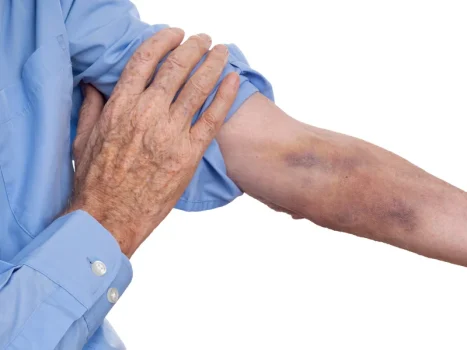Blood thinners and alcohol: Safety, effects, and more

Drinking alcohol interferes with this process because it causes additional PTH to be released. Over time, this can result in too much calcium leaching from the bones. When there’s not enough calcium present, a reduction in bone density and a higher risk for fractures can result.

What are some signs I should call a doctor?

In one systematic review and meta-analysis of six studies, researchers concluded that there is a positive association between alcohol consumption and osteoporosis risk. On the other hand, thick blood can increase the risk of blood clots and thrombosis, which can be life threatening. Thin blood means having too few platelets, a part of the blood that blood thinners and alcohol side effects helps clots form. Thin blood typically does not cause symptoms but can lead to excessive bleeding and bruising. Not only that, some people experience an increase even after one or two drinks because their body processes alcohol differently. There are too many variables to make a blanket statement that alcohol is good for your blood pressure.

Alcohol’s Effects on the Cardiovascular System
Blood clotting, also known as coagulation, is a complex process that helps to prevent excessive bleeding when a blood vessel is damaged. It involves a series of steps that result in the formation of a blood clot, which seals the injured blood vessel and promotes healing. Alcohol https://ecosoberhouse.com/article/blood-thinners-and-alcohol-risks-and-side-effects/ consumption has various effects on the human body, including its impact on the blood. Understanding these effects is crucial in debunking the myth surrounding the idea that alcohol can thin your blood. Let’s explore the immediate and long-term effects of alcohol on blood.
- Teenagers’ brains are still developing, which makes them more susceptible to adverse physical and mental health effects.
- Silver Pines and Steps to Recovery have provided addiction recovery programs in Pennsylvania for over a decade with detox, residential, outpatient, and sober living services.
- When these add up, it’s time to reevaluate your relationship with alcohol.
- Heavy alcohol use impairs brain functions, such as memory and reasoning.
- This results in impaired bone cell turnover and weaker bones over time.
Does Alcohol Thin Your Blood? Risks of Alcohol and Blood Thinners
“Some people think of the effects of alcohol as only something to be worried about if you’re living with alcohol use disorder, which was formerly called alcoholism,” Dr. Sengupta says. If you take blood thinners and wish to consume alcohol, speak to your healthcare provider first. They will consider the state of your health and the medications you take. They may be able to advise you on how often and how much alcohol you can consume safely. Consuming alcohol leads to a lower number of blood platelets because the substance hinders the bone marrow’s ability to produce these cells.
Frequently Asked Questions on Blood Thinning and Alcohol
It’s important to note that any amount of alcohol in your system can interfere with your ability to think and function without impairment. Alcohol use suppresses the central nervous system and destroys neurons. This can lead to conditions like stroke, amyotrophic lateral sclerosis (ALS), Alzheimer’s disease, and multiple sclerosis (MS). Your liver produces enzymes that break down alcohol, but your liver can only handle so much alcohol at one time (approximately 1 ounce per hour).
- There is a common belief that consuming alcohol can thin the blood, leading to various misconceptions and concerns.
- The same is true if brushing or flossing your teeth start to cause bleeding.
- Furthermore, alcohol can also interfere with the production and activity of clotting factors, which are essential for the blood clotting process.
- Corticosteroids, such as prednisone, can help slow down platelet destruction.
- But prolonged alcohol abuse can lead to chronic (long-term) pancreatitis, which can be severe.
Alcohol poisoning, or alcohol overdose, occurs when you drink more than your body can handle. Your BAC increases to the point that it disrupts areas of the brain controlling essential functions like heart rate, breathing, and temperature control. For example, a usually shy and quiet person may become increasingly chatty, socially confident, and outgoing when drinking alcohol. Lowered inhibitions can also lead to poor decision-making and increase the risk of engaging in risky behaviors. Alcohol’s impact on neurotransmitters like serotonin and GABA can also contribute to mood changes the day after drinking. Once the effects of alcohol wear off, glutamate (a neurotransmitter) levels increase, which can lead to feelings of depression and anxiety, or “hangxiety” (hangover and anxiety), the day after drinking.
Activation of PKCɛ may protect the myocardium against ischemia–reperfusion injury by stimulating the opening of mitochondrial ATP-sensitive potassium channels. This in turn prevents the opening of the mitochondrial permeability transition pore (Walker et al. 2013). By Geralyn Dexter, PhD, LMHCDexter has a doctorate in psychology and is a licensed mental health counselor with a focus on suicidal ideation, self-harm, and mood disorders. American Addiction Centers (AAC) is committed to delivering original, truthful, accurate, unbiased, and medically current information. We strive to create content that is clear, concise, and easy to understand.
Dangers of Mixing Alcohol and Blood Thinners
- Bone cells, called osteoclasts, break down parts of your bones to release more calcium into your bloodstream, a process called resorption.
- When you drink, try to have a meal or snack before having a cocktail or have a glass of wine with a meal, which will slow absorption of alcohol, Weaver says.
- A glass or two of wine daily may (or may not) reduce your risk of heart disease or ischemic (clotting) strokes.
- Because heart failure patients usually are older (over age 65) and often are prescribed numerous medications, both the effects of age and of medication use should be carefully considered by patients, clinicians, and researchers.
- However, it is always advisable to consult a doctor or pharmacist before drinking alcohol with any new medication.
- In cardiomyocyte mitochondria as well as other mitochondrial types, such imbalances could lead to further decreases in cellular respiration and oxidative phosphorylation.
